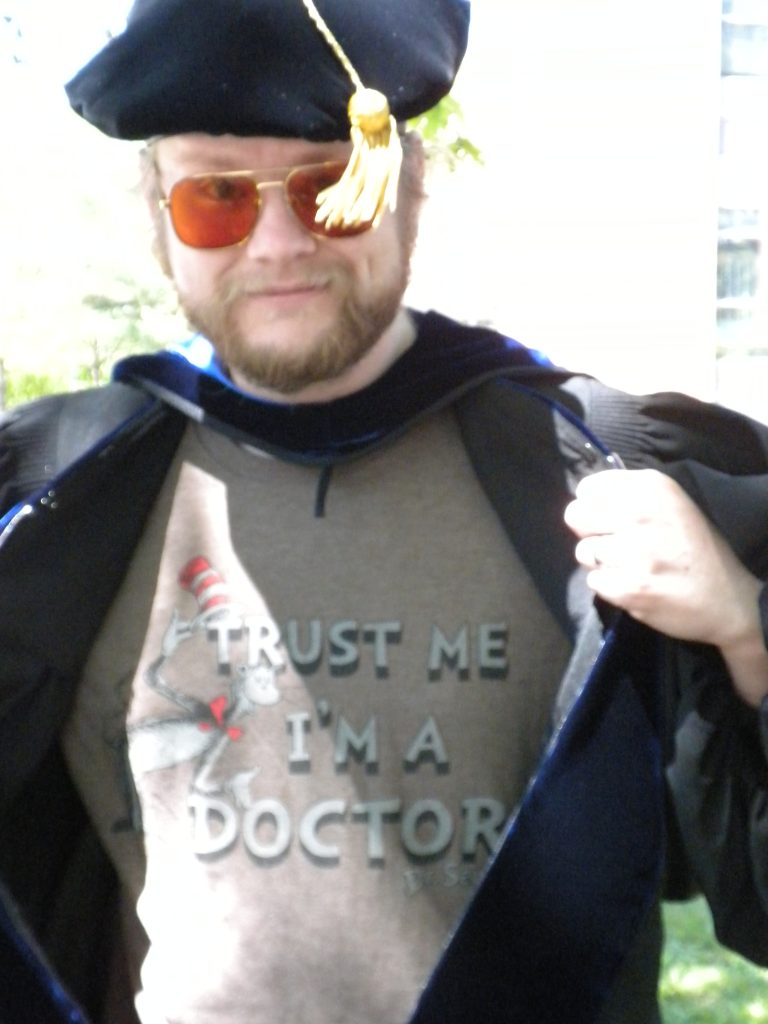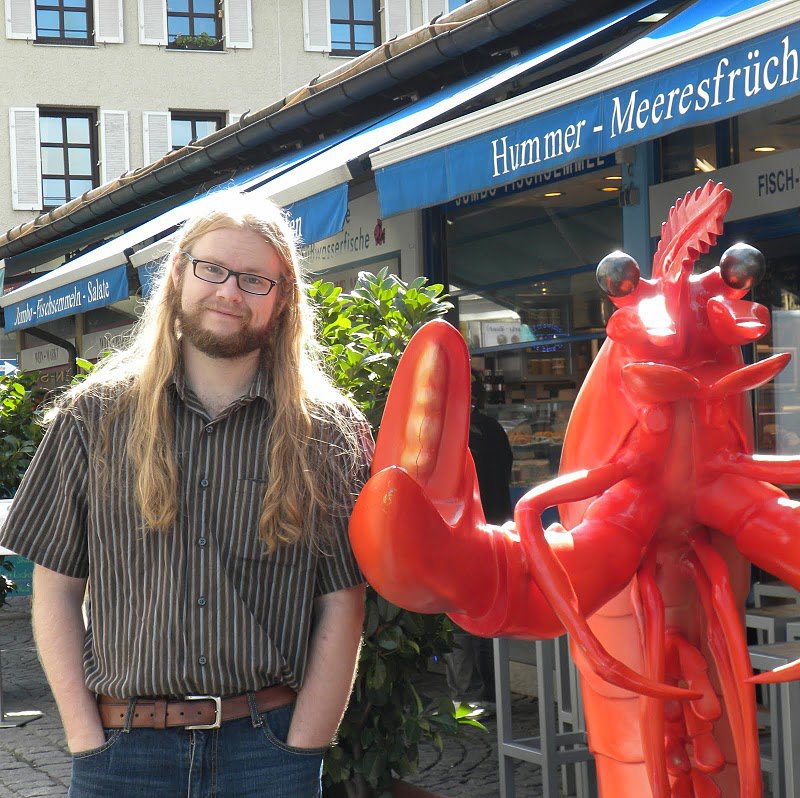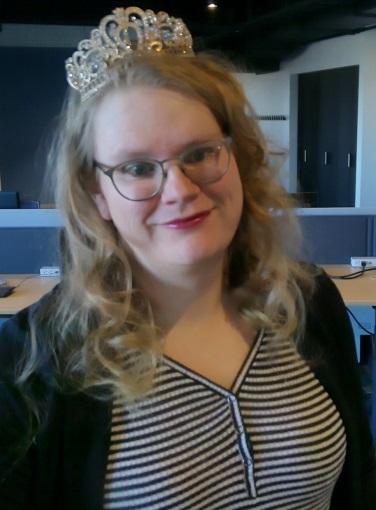I really loved my undergraduate experience. I had supportive friends, engaging classes, and I finished it off by meeting the woman whom I’d later marry. All of that and the freedom to start figuring myself out. As I discussed previously, I wasn’t out yet. I didn’t even realize, that I was trans at that point. I knew that they way I dressed, the things I did, and how I felt was different. I was also perfectly happy to just be different and leave it at that.
The professional world, I would discover, was much less happy with this arrangement.
Round 1: Interview!

As with all soon-to-be college graduates, I was very interested in finding work. It consumed most of my non-class hours. Sometimes I’d be stiff-armed during a career fair. People just wouldn’t speak to me. If I got past that, it was rare to get calls back.
I had the second most awkward interview of my career during this time. My tongue ring fell out of my mouth and onto the table during a technical interview. It’s impossible for me to describe how rattled that made me. I didn’t recover for the rest of the interview. To be honest, I’m not sure I’ll ever recover.
Suffice to say, I did not find a job in my first attempt. I went to our career center and asked for advice. What I was doing wasn’t working, and I wanted to get that job. Their recommendations will surprise no one:
- Cut your hair & dye it back to your natural color
- Wear pants to the career fair, and preferably, a suit
- Make the following handful of edits to your resume
It worked. My first rounds of interviews were a mess because of how I presented. I got further by being what my interviewers expected to see.
Dress for the job you want

Eventually I got a job offer I was super excited about. I liked the work, and I knew and liked many of the people. The interviewing process went well, and I got an offer, on one condition. They needed me to wear pants all the time. They brought this up because, well, the people there knew me too.
And I thought to myself “Why?”. My skirts were all modest. Client contact was limited. What could it possibly matter? But it did, and I needed work. As much as I wanted to work for that consultancy, I wanted to express myself how I had so far. I believed I would be able to do that as a grad student, and so I got my PhD.
The thing is, I was wrong about colleges being more accepting. It depended on the people and your station. One of the first pieces of advice I got from my PhD advisor was that I needed my work to be more interesting and remarkable than me. I was told to tone down and fit in so that people would be paying attention to my work and not how I looked.
Push Down Automata
I wish I hadn’t, but I listened to him. I pushed down all my natural instincts about how to be. I did what I could to fit in, in pursuit of success. And I got it, but I got miserable too. I struggled with insomnia and leaving the house. I avoided my friends. I barely spoke to my wife.

I blamed my misery on grad school, and hoped graduating would turn things around. I assumed I’d be happy in a small lab as a research scientist. I wasn’t. I thought a larger, more prestigious lab with more money would help. It didn’t.
In fact, it got worse. A larger lab meant needing to carry a clearance. I didn’t disclose that I used to wear skirts. It looked like I was hiding something, and that’s a no-no. You look like you can be blackmailed, making you a liability. I didn’t think of myself as closeted, but the government sure did. That was the first job I knew for certain I lost because of how I am.
It’s Not Entirely Better Now That I’m Out

I lock up like a deer in headlights when I’m invited to women-only events. I know I belong there, but that’s not universally agreed upon. As much as I want the opportunities to network, bond, and find mentors, I also don’t want to be a distraction. Even though it’s never me being disruptive, if someone else makes a scene, the event still gets disrupted all the same.
Even mixed-gender networking events are challenging. They’re almost always in a shared space, like a bar or restaurant. They also run long enough that I’ll have to use the restroom at some point. I’ve left events early because someone took issue to me in a restroom or in line for the bathroom. Every time I go to an event, I have to ask: “Do I have the energy to deal with that if it happens this time?” Sometimes I just stay home.
If it were just special events, that would be a much better world. It’s the day to day as well. Work social events aren’t enjoyable for me because I often get misgendered. I’d avoid them, but unfortunately that networking is critical to getting work done. On top of the base upset of being repeatedly misgendered, I have extra work. Should I correct them or preserve that social capital for doing my actual job?
So, to recap
I promised you all a discussion of how anti-trans sentiment has steered my career. I’ve never been fired explicitly for my identity, though I have lost a job because of it. That makes me incredibly lucky, as far as such things go. How much I get to express myself has been a deciding factor in what jobs I’ve taken, and which I haven’t, my whole career. That’s the first and most obvious influence.
Anti-trans sentiment has influenced my tenure at jobs in subtler ways. I’ve spent most of my career closeted or ignoring my identity. I’ve been repeatedly directed to do so. It’s incentivized. It also made me miserable. It’s hard to justify staying in a position when you’re unhappy. It’s also easy to misattribute why you’re unhappy if you’re motivated to do so. And man, no one’s reasoning was ever as motivated as mine trying to convince myself I wasn’t trans. My current job, where I’m out, is my longest tenure by a factor of 2. That’s not coincidence.
I’ve also, dubiously, been lucky one other way: I could choose to present as a cis gendered guy. Almost every time I’ve had the option to do so to advance my career, I’ve done so, until recently that is.
Next time, we’ll talk about what it was like to come out at work.